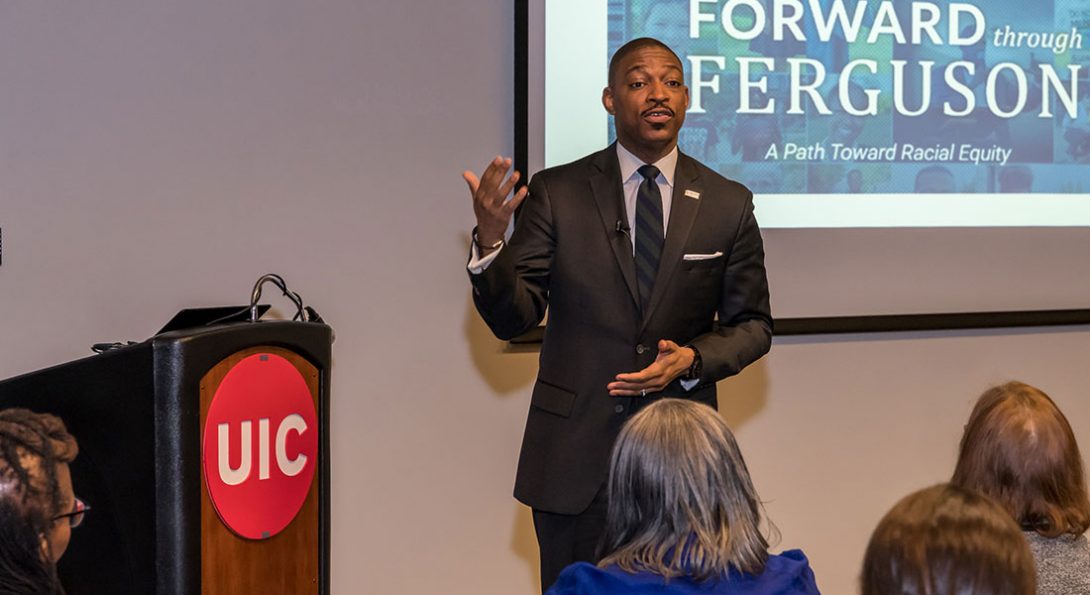The Journey to Child Well-Being

“I invite you to join us on the journey to child well-being that goes through racial equity.”
This earnest invitation was the Reverend Starsky D. Wilson’s closing remark for the 23rd Karen Honig Memorial Lecture hosted by the Jane Addams College of Social Work on Wednesday, April 5, 2017.
The Rev. Wilson’s lecture was entitled JUST FOR KIDS: Pursuing Racial Equity to Achieve Child Well-Being. In his presentation, he traced the journey he found himself taking after the shooting of Michael Brown Jr. in Ferguson, Missouri on August 9, 2014.
The journey was toward child well-being, but it was not along the path he’d expected.
The Event that Altered His Course
2014 was to have been an auspicious year for the city of St. Louis. It was celebrating its 250th anniversary, and the Rev. Wilson was planning a large symposium to be held at the Federal Reserve Bank of St. Louis. The symposium would bring together scholars from around the world, and engage businesses and policymakers to discuss global approaches to achieving child well-being.
But, as the Rev. Wilson described it, the killing of young Michael Brown “smacked them in the face.”
2014 was not the auspicious year that had been hoped for, but it became a very important year. It was the year that the senseless death of a teenager, shot on the streets of a small Missouri town, ignited a firestorm of protests across the country. And those protesters shined a spotlight on the structural inequities that existed in Ferguson.
This was what set the Rev. Wilson down that unexpected path.
In October of 2014, instead of preparing for his symposium, he was appointed co-chair of the Ferguson Commission, tasked with studying the situation in the town of Ferguson and laying out a path toward positive change. Three thousand people engaged in that process over the course of 11 months.
As a result of their effort, the commission’s report, Forward Through Ferguson, makes over 189 calls to action in the four critical categories of racial equity, justice for all, opportunity to thrive and economic empowerment.
Building Communities that are “Just For Kids”
Drawing on what he learned through his experience on the Ferguson Commission, the Rev. Wilson observed that, as a nation, we have proven our inability to prioritize children, and to put them at the center of all that we do. He went on to explain that racial inequities in education and opportunity do more than endanger individual children, they weaken the very communities in which those children live.
To highlight the stark inequities that exist in American society, he cited three statistics:
- Twice as many black children live in poverty as white children.
- Hispanic children are twice as likely as white children to be malnourished.
- Children of racial minorities are also more likely to be “sentenced” to school suspensions, placing them on a fast track to prison cells.
The Rev. Wilson then entreated the audience to start building a community that is just for children, a community that seeks situational fairness for them, and seeks equity on their behalf.
He invited us to take that much-needed journey to child well-being, that goes first through racial equity.
Reverend Starsky D. Wilson is a pastor, philanthropist and activist pursuing God's vision of community marked by justice, peace and love. He is president & CEO of Deaconess Foundation, and pastor of Saint John's Church (The Beloved Community). Through Saint John's, Wilson has led congregational activism on myriad issues, including youth violence prevention, Medicaid expansion, public school accreditation, voter mobilization, capping payday lending and raising the minimum wage.
The Karen Honig Memorial Lecture Series: Karen Honig received her Master of Social Work degree from the Jane Addams College of Social Work in 1986. Her family and friends established the Karen Honig Memorial Lecture to honor her memory and to focus on her commitment to inner city children and youth, and their families.